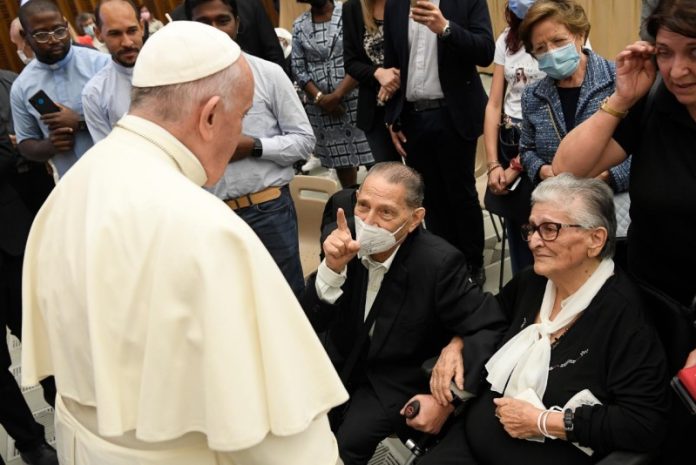Pope Francis on Wednesday encouraged people not to hide their wrinkles, saying “it’s the heart that matters.”
In his general audience address on June 8, the pope praised the “wise Italian actress” Anna Magnani for refusing to allow her wrinkles to be concealed.
Magnani, who died in 1973 at the age of 65, is said to have once told her make-up artist: “Please don’t retouch my wrinkles. It took me so long to earn them.”
Pope Francis cited the Oscar-winning actress, nicknamed “La Lupa” (“the she-wolf”), during a reflection on “the myth of eternal youth.”
He said: “Everything is done to always have this youth — so much make-up, so many surgical interventions to appear young. The words of a wise Italian actress, Magnani, come to mind, when they told her she had to remove her wrinkles and she said, ‘No, don’t touch them! It took so many years to have them — don’t touch them!’”
“This is what wrinkles are: a sign of experience, a sign of life, a sign of maturity, a sign of having made a journey. Do not touch them to become young, that your face might look young. What matters is the entire personality; it’s the heart that matters, and the heart remains with the youth of good wine — the more it ages, the better it is.”
The pope’s live-streamed catechesis was the 13th in a cycle on old age that he began in February. He entered St. Peter’s Square in a white jeep, stopping to invite children in bright green hats to join him for part of his journey among pilgrims.
The jeep drove up to a raised platform in front of St. Peter’s Basilica, where the 85-year-old was helped to walk up to the white chair where he gave his address. The pope, who has made public appearances in a wheelchair since May 5 due to knee pain, used a walking stick.
Pope Francis’ catechesis focused on the conversation between Jesus and Nicodemus, a Pharisee, described in John 3:1–21. The pope noted that the member of the Sanhedrin, an assembly of elders, was confused by Jesus’ declaration that “no one can see the kingdom of God without being born from above.”
He said: “Nicodemus’s objection is very instructive for us. We can, in fact, turn it upside down, in the light of Jesus’ word, with the discovery of a mission proper to old age.”
“Indeed, being old is not only not an obstacle to the being born from above that Jesus speaks of, but it becomes the opportune time to illuminate it, disassociating it from being equated with lost hope.”
He went on: “Our epoch and our culture, which demonstrates a worrisome tendency to consider the birth of a child as the simple matter of the production and biological reproduction of the human being, cultivate the myth of eternal youth as the desperate obsession with an incorruptible body.”
“Why is old age not appreciated in so many ways? Because it bears the undeniable evidence of the end of this myth, that makes us want to return to our mother’s womb always to return with a young body.”
The pope said that when old age is seen from the correct perspective, it has “a unique beauty.”
“Old age is the condition granted to many of us in which the miracle of this birth from above can be intimately assimilated and rendered credible for the human community,” he reflected.
“It does not communicate a nostalgia for a birth in time, but of a love for our final destination. In this perspective, old age has a unique beauty — we are journeying toward the Eternal.”
He added: “No one can re-enter their mother’s womb, not even using its technological and consumeristic substitute. This is not wisdom; this is not a journey that has been accomplished; this is artificial. That would be sad, even if it were possible. The elderly person moves ahead; the elderly person journeys toward the final destination, towards God’s heaven; the elderly person journeys with the wisdom of lived experience.”
He added: “No one can re-enter their mother’s womb, not even using its technological and consumeristic substitute. This is not wisdom; this is not a journey that has been accomplished; this is artificial. That would be sad, even if it were possible. The elderly person moves ahead; the elderly person journeys toward the final destination, towards God’s heaven; the elderly person journeys with the wisdom of lived experience.”
“Old age, therefore, is a special time of disassociating the future from the technocratic illusion of a biological and robotic survival, especially because it opens one to the tenderness of the creative and generative womb of God.”
Concluding his address, Pope Francis said that today’s “throwaway culture” mistakenly sought to “throw out the elderly.”
“The elderly are the messengers of the future, the elderly are the messengers of tenderness, the elderly are the messengers of the wisdom of lived experience. Let us move forward and watch the elderly,” he commented.









